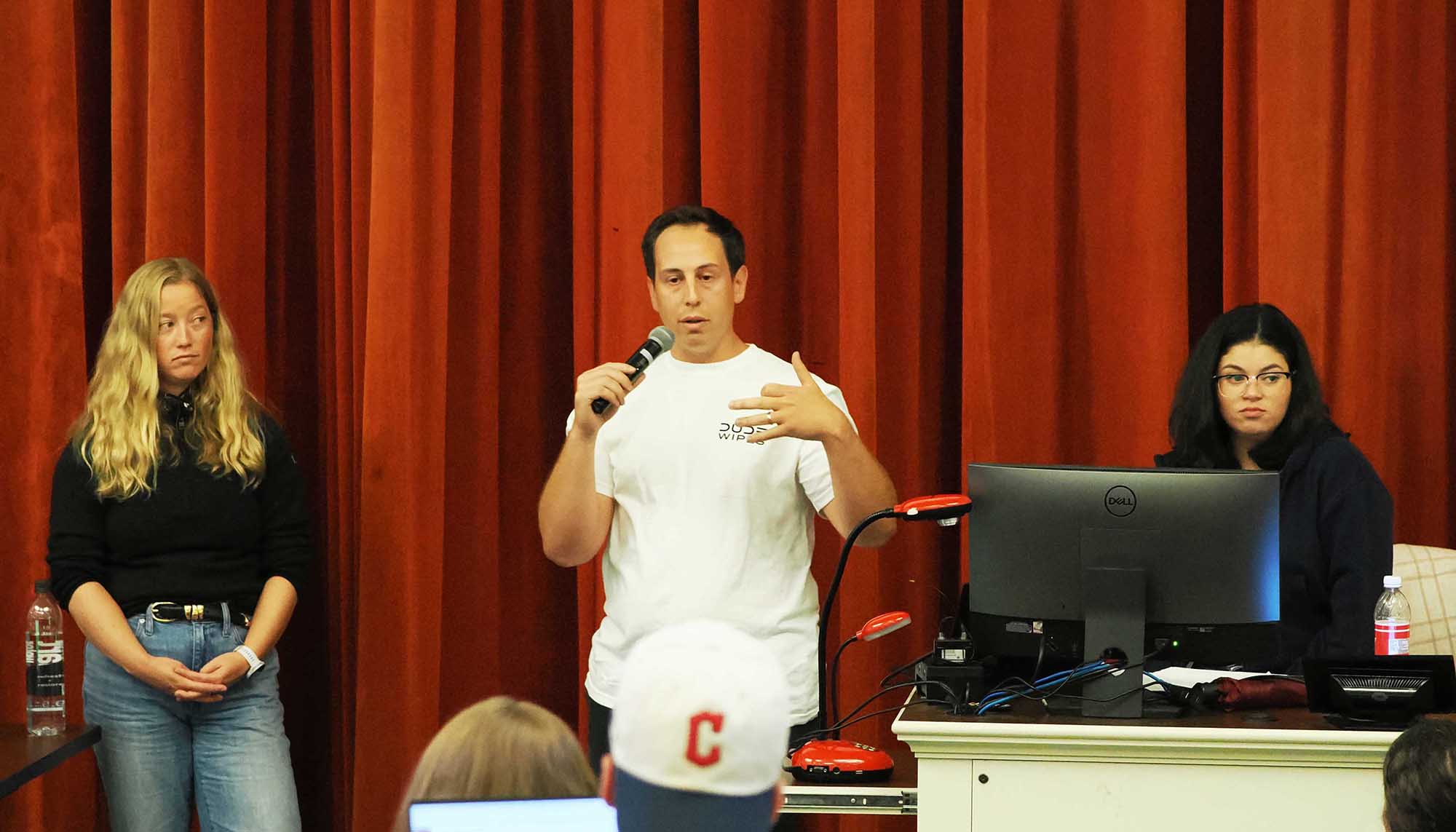Miami alumni discuss innovations, challenges for DUDE Products' supply chain
Company brings AI to bear in efforts to keep flushable wipes flowing

Miami alumni discuss innovations, challenges for DUDE Products' supply chain
Not every Executive Speaker Series event brings guests who park a car called the “Mini Pooper” with a plastic poo emoji on the roof outside the Farmer School of Business (FSB).
But beyond the obvious humor that DUDE Products employs to promote the brand and raise awareness is a company that’s had rapid growth, production scaling challenges, and is fighting for its part of a market category expected to exceed $1 billion this year.
Miami University alumni Greg Brown, Stephanie Petrusha, and Ashley Cross came to FSB to talk about supply chain, the unique challenges their company has faced, and how the company uses technology and AI to help get products to consumers.
“I was the first employee outside the founding group,” said Brown, senior vice president of operations. He graduated from Miami in 2014 and joined DUDE in 2021. “I was helping other startups and DUDE Wipes had a few questions. We had a 30-minute meeting turn into a two-hour meeting, and then I just stayed in touch. Two years later, they were ready to start hiring.”
"I think it's important to start with marketing, because the bathroom is one of the last taboos. Everybody goes, but nobody talks about it. That silence, that's what we lean into, that where we like to have fun. Our VP of creative, Andy Anderson, said poop is objectively funny, and when you lean in the humor, it disarms people who might otherwise be skeptical," Brown said. "So we've really leaned into that, and we make it fun to laugh and talk and share all the bathroom stories that people might have."
Petrusha, a 2015 graduate, works as senior operations manager and also joined the company in 2021. She said her role is all about getting the product in front of potential customers. “When we talk about operational execution, we're always thinking about DUDE and how the end consumer is going to be able to purchase our item. So, we always want to be on shelf and being able to put that item in their cart, whether that's retail, like in an actual store, or you want to put that in your virtual cart on Amazon, that's always what we're thinking about,” she said.
“We also have to think about what our network is going to look like from a strategic standpoint as well. So, we always want to execute on our day-to-day ordering, but what does the next year look like? What do the next five years look like? Having the right warehouse network is really imperative to making sure our product is in the right locations to service our customers,” Petrusha said.
Cross, a 2013 alumna who joined as senior manager of supply and procurement three months ago, explained the company’s demand planning monthly cycle. “The first week, we're doing analysis of the previous month's performance, looking at the biases and the accuracy of the forecast, and we're also preparing the data questions and baseline forecast for the next week’s collaborative collaboration calls with sales,” she said. “The second week, we're doing sales and collaboration insights. We're looking at the distribution, the number of stores that we're in, the assortment of SKUs (Stock-Keeping Unit) in those stores, velocities, promotions that might have changed, and then the timing and buyer acceptances. Then we're looking to resolve disputes and decisions with the data that we had and making judgment calls on the new forecast on in the third week, and then the fourth week, we're publishing the forecast to supply and the finance teams to align what we're doing to stay in stock."
"Over the last four or five years, we've been making double digit growth in producing packs,” Cross said.
Brown said the company’s challenge is scaling production to the capacity needed to meet demand, while making sure that the wipes that are produced and sourced meet the company’s standards. “Supply chain needs to guarantee that the quality is going to be the same every single time that you use one of our wipes. So, we can't just go to any wipe manufacturer. They don't all make flushable wipes. They make Clorox wipes or baby wipes, and those are not flushable.”
The company uses third-party logistics companies to get their products where they need to be, Brown said. “We have the control tower at the DUDE headquarters, and we're directing and telling the supply chain how to operate, how to flow, when and where to move product,” he said.
Brown said the company has also been creating artificial intelligence agents to manage aspects of the supply chain, such as “Diesel Dan.” “Diesel Dan is planning truckloads to move inventory around that network. Diesel Dan is using live inventory feeds in our network. It's running on all these optimization rules that we've given it. What can a truck load? How big? How heavy can it be? How many pallets can it have? And it's optimizing how to maximize the truck and move priority product throughout the network,” he said. “Once it has that list of what to do, those actions that it's suggesting it makes, it lets a human know via Slack, an analyst on the team, and they have to approve that suggested list of trucks.”
“We have examples of Dan looking at 145,000 different truckload combinations. When we were doing this in Excel, we may be looking at 30 or 40 combinations. So, we are getting way more optimization, way more efficiency out of using this AI agent,” Brown said. “Our goal is really to let the business run on its own and only need to manage exceptions, otherwise, analysts in the people should be looking at how to make businesses more efficient and run more smoothly,”